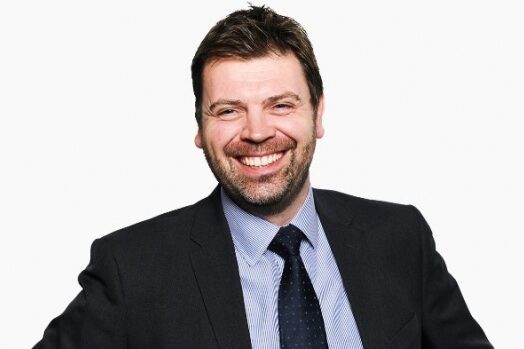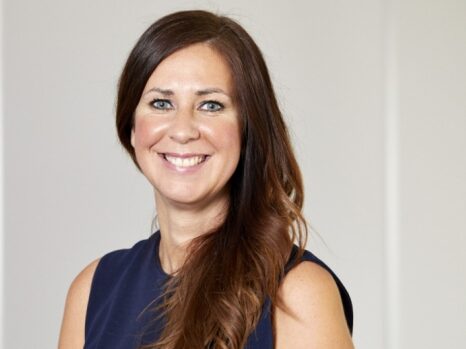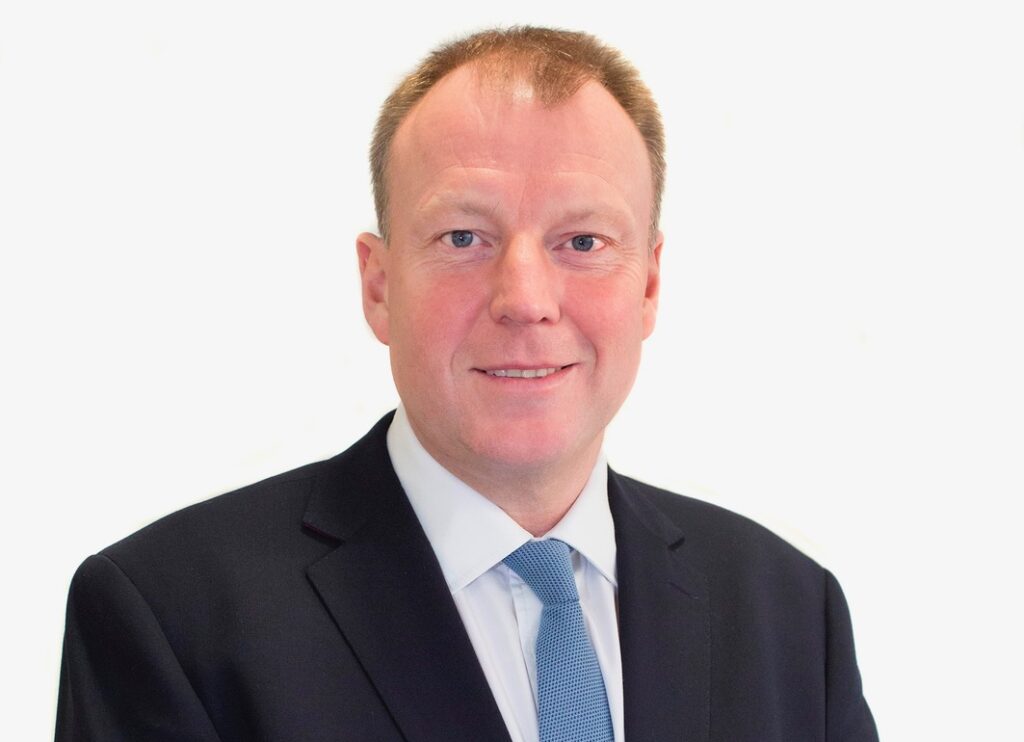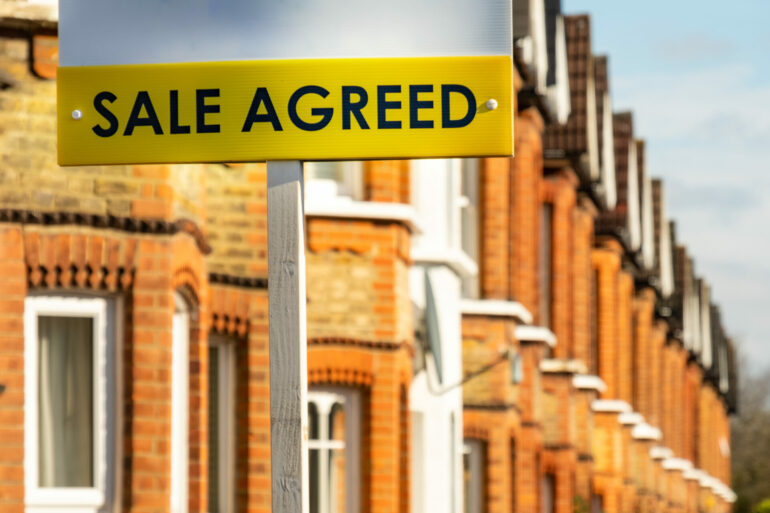Average house prices in the UK increased by 7.8% in the year to June 2022, down from 12.8% in the year to May 2022, according to the latest ONS figures.
On a non-seasonally adjusted basis, average house prices in the UK grew by 1.0% between May and June 2022, representing the eighth consecutive monthly increase. This compares with an increase of 5.7% during the same period a year earlier (May and June 2021).
On a seasonally adjusted basis, average house prices in the UK increased by 0.5% between May and June 2022, following an increase of 0.8% in the previous month.
Looking across the nations, the average house price in Scotland increased by 11.6% over the year to June was unchanged from an increase of 11.6% in the year to May.
The average house price in Scotland now stands at a record level of £192,000.
In Wales the average house price increased by 8.6% over the year, down from an increase of 14.1% in the year to May. The average house price in Wales was at another record level of £213,000 in June 2022.
While the average house price in England increased by 7.3% over the year, down from an increase of 13.0% in the year to May. The average house price in England was also at a record level of £305,000 in June 2022.
In Northern Ireland the average house price increased by 9.6% over the year to Quarter 2 (Apr to Jun) 2022. Northern Ireland remains the cheapest UK country in which to purchase a property, with the average house price now standing at £169,000.
Reaction
Nathan Emerson, Propertymark CEO:
“Latest data from the ONS reports on the market in June, so it’s not surprising that an increase is again being seen in the average house price. As of this month however, for the first time since the recent hikes in prices, data has shown that the average is starting to decrease.
“Despite this slowing in the market, agents continue to report increases in the time taken to exchange, with our latest Housing Market Report showing that 41 per cent of sales took 17 weeks or more to go through, compared to just 10 per cent pre-pandemic.
“With interest rates rising, homebuyers, having secured a mortgage in principle at lower rates prior to even viewing any available properties, could well be starting to see them expire before exchanging. This could then have knock on effects on both fall throughs and affordability ratios.”

James Briggs, head of personal finance intermediary sales at specialist lender Together:
“House prices crept up again in June, by 7.8%, despite the surrounding economic and political upheavals in the UK and abroad. However, many signs point to the housing market cooling in the coming months.
“Despite today’s increase, economic uncertainty and sluggish growth continues to put pressure on people’s finances, potentially deterring prospective buyers from pursuing their property plans this year. With higher interest rates, increasing costs and rising inflation, buyers and sellers may continue to find prices begin to drop as demand softens. Given the potential of a recession, how long this’ll last is not yet clear. The market remains volatile, and we can expect much more price activity as we enter the winter months.”
Simon McCulloch, Chief Commercial & Growth Officer at Smoove:
“Despite a slight decrease, house price growth still remains firmly in the double digits – outstripping current inflation figures. It’s also normal to see prices dip around this time of year as people try and enjoy the summer holidays.
“However, the combined effect of the rising cost of living and base rate rises mean that many buyers are finding their affordability squeezed. Ultimately, there’s a clear divide between house prices, greater supply, and constrained affordability.
“Gazundering – people reducing their offer to reflect house price valuation decrease – may also start weighing on the minds of sellers who are currently on the market. Against this backdrop, home moving remains a frustrating experience.
“It’s protracted, confusing and incredibly stressful, and both gazundering and gazumping play into this. It is time the analogue process was digitised.
“Whether you’re a lender, buyer, homeowner, solicitor, or estate agent, adopting new technology will help make the transition for all parties involved quicker and more efficient.”

Clare Beardmore, head of broker and Propositions at Legal & General Mortgage Club:
“While growth is gradually slowing, the housing market is thankfully proving more resilient than we might have hoped.
“The threat that a recession poses to house prices certainly shouldn’t be overlooked, but the imbalance between housing supply and demand and the UK’s longstanding commitment to homeownership are among the factors counterbalancing this, or at least for the time being.
“Over half a million people aged between 50 and 65 have also left the workforce since the pandemic began, stimulating further property sales.
“Although house price inflation will likely dip in the coming months, this should not alarm anyone.
“The desire to press ahead in the face of economic headwinds is matched by lenders, advisers, and borrowers.”
James Forrester, managing director of Barrows and Forrester:
“While both the monthly and annual rate of house price growth may have slowed quite considerably, the property market continues to march forward in fine form despite the fact that the rest of the economy is crumbling.
Of course, many will be quick to flag a reduced rate of growth as a sign that a market crash may be looming, but this amounts to little more than premature waffle and it’s important that we view a slower rate of growth in context with the period of unprecedented boom we’ve just experienced.
House prices are still up on a monthly and annual basis and given the instability of the wider backdrop right now, this is proof, if it was ever needed, that property is the safest investment you can make.”
Marc von Grundherr: director of Benham and Reeves:
“The UK economy is sailing head on into some very stormy seas at present, all while the captain remains on shore leave with no replacement yet to take the helm.
But despite this, the boat is yet to rock where the property market is concerned and the economic woes of rising inflation, increasing interest rates, and a cost of living crisis continue to bounce off the hull like mere pebbles rather than unforeseen ice bergs.
It’s inevitable that the property market was eventually going to slow from the high rate of knots it’s been moving at throughout the pandemic, but we’re yet to see any signs of it sinking and this is likely to remain the case.”
Chris Hodgkinson: managing director of House Buyer Bureau:
“It very much looks like a matter of when, rather than if, with regard to the UK entering a period of recession and this will further fuel the economic angst that is currently gripping the nation.
While the property market has stood firm so far, we can expect a far greater level of uncertainty, coupled with hesitations on both the side of buyers and sellers, to cultivate a much less settled outlook over the coming months.
For those that do press on with a purchase, the ability to borrow will come at a greater cost and this will impact the price they are willing to pay, which in turn, will force sellers to lower their expectations when it comes to pricing their home for sale.”
Almas Uddin, founding director of Revolution Brokers:
“It’s a very real possibility that interest rates will rise to between three and four per cent in an attempt to curb the 40 year high in inflation we’re currently seeing.
Although this will still be a historically low rate of interest, it will no doubt startle a generation of homebuyers who have known nothing other than a sub 1% base rate until recently.
The result of which is likely to be a reduction in buyer demand and a more modest approach to borrowing, with these factors causing the previously high rates of house price growth seen over the last few years to plateau further.”

Mark Harris, chief executive of mortgage broker SPF Private Clients:
“As house prices continue to rise in most parts of the country, inflation soars to 10.1% and with another 50 basis points rise in interest rates on the cards at the next Monetary Policy Committee meeting, there is growing concern around affordability and borrowing potential.
“With money market rates continuing to rise, mortgage pricing is also edging up accordingly. Borrowers need to move quickly to secure the best mortgage rates as they are often pulled at short notice.
“Service levels also vary considerably between lenders so transactions can take longer than borrowers anticipate, particularly if their case is complex, so advice is more important than ever.”
Anna Clare Harper, director of real estate technology platform IMMO:
“This slowdown in price growth will be welcomed by those struggling with affordability constraints, since the average house price remains over 10 times average annual individual earnings
“It also makes sense. House prices and house price growth figures both reflect and affect consumer and investor confidence.
“House prices are the result of supply and demand. Interest rate rises and talk of recession are cooling demand. In recessionary times and when interest rates are higher, demand for buying properties tends to fall. However, we all still need a roof over our heads. Demand for housing does not fall. Demand shifts from buying to renting properties, which offers more flexibility.
“Unfortunately, the shortage of supply of both properties for ownership and for rent continues. For this reason, the slowdown in growth should not be taken as an indicator of a major crash to follow.
“Professional investors are needed to plug the gap in quality, energy efficient, affordable homes for people and communities across the UK.”
Ryan Joyce, director of Nottingham-based independent mortgage broker, Key Mortgages:
“While the June annual growth rate has been skewed by the stamp duty holiday, it almost certainly reflects the general direction house prices will be headed given the extreme economic headwinds ahead.
“Though there’s still demand for property, with first-time buyers particularly active, we could see a 5%-10% fall in house prices over the course of the next year. The primary reason for the downward pressure on prices will be mortgage companies lending less due to the sharply rising cost of living and displaying broader caution amid the deteriorating economic climate.
“House prices will have to come down to meet those lower lending limits. It’s as simple as that. I do not see the immense property crash happening that some are predicting as the jobs market is still fairly robust for now and supply is limited.
“But with inflation now in double digits, prices will almost certainly come down during the turbulent twelve months ahead. But as ever with the housing market, sooner or later values will start to rise again.”
Graham Cox, founder of the Bristol-based broker, SelfEmployedMortgageHub.com:
“I’ll be surprised if house prices don’t plummet at least 5%-10% over the next 12 months. Property prices are unsustainable in the current economic climate. It doesn’t matter that there’s a shortage of property, because buyers can only afford to pay what they can afford to borrow. And borrowing is getting a lot more expensive, along with everything else.
“We can’t go on pretending that ever-increasing house prices are a good thing. In London, property is priced at 11 times average earnings.
“Ordinary people and the young are being priced out of owning their own home by inept politicians, only too happy to ignore this economic vandalism if it wins them votes. Let’s just hope the house price balloon deflates before it pops.”
David Robinson, chartered wealth manager at London-based Wildcat Law:
“Even though inflation is now in double digits, erosion rather than a landslide is the best way to describe what will happen to house prices over the coming 12 months. Due to most houses in the UK being owned by those aged 55 and above, we are unlikely to see a wave of defaults in the same way as the early 90s even if the cost of living really hits home and unemployment starts to increase.
“What we are likely to see is a very stagnant market place with few looking to sell. This means house prices are unlikely to fall significantly with the exception of some over priced recent builds. In 12 months’ time, house prices will roughly be at the same level that they are today, reflecting a real reduction due to inflation.
“If the Government fails to get control of the situation, the longer 24 month picture is not so rosy, though. As people come off 2-year fixed rates and are forced to pay far higher mortgage payments, we could see forced sales. Likewise, if unemployment rises sharply then all bets are off and we should be prepared to see double digit percentage falls across the country.”
Paul Neal of Derbyshire-based Missing Element Mortgage Services:
“There is only one direction house prices can go, and that’s down, all the more so with inflation now in double digits. Even then, there will be a gradual reduction in the rate of price growth rather than a drastic fall due to supply issues.
“With the cost of living crisis really hitting hard, people can no longer afford to be hitting the top of their budgets and the balance of power is shifting back to buyers quite rapidly now. Sadly, it will be bad news on both sides, with vendors selling for less and buyers paying less but at higher mortgage rates. If there are any winners, it will be the cash buyers.”
Jonathan Burridge, founding adviser at hybrid mortgage adviser, We Are Money:
“I don’t agree with the rose-coloured view being expressed by many, including the Bank of England, that property prices are cast-iron and will not dive. This message is being aired for reassurance. If we hit a full-blown recession then the demand to move home will be affected. Every pundit expressing a positive view cites “supply and demand” as the main driver for property prices. If demand drops, so will prices.
“Those predicting a 20%-30% reduction in house values are being too pessimistic. That’s a highly unlikely scenario.
“Any reduction will be short-lived, relatively speaking, and therefore anyone buying property now needs to be looking at the longer term, seeing past any approaching dips.”
Lewis Shaw, founder of Mansfield-based Shaw Financial Services:
“If house prices do fall, it will only be by 2%-3%, and the rationale is pretty simple: we currently have an acute housing shortage, which will support prices.
“Moreover, if sterling weakens further, that will likely be met with foreign money piling back into UK property as it becomes more attractive. All in all, though the rate of price growth will almost certainly slow in the short term, a crash is not on the cards.”
Mark Hosker, director of Bradford-based mortgage broker, Cyborg Finance:
“In most areas, we’re predicting continued but steady growth in house prices. Certainly nothing like the growth we have seen over the past two years.
“The country’s ongoing economic woes will almost certainly reduce demand though a shortage of available housing will support prices to an extent. How conservative lenders get will be critical to house prices as that will impact what people can borrow.”
Rhys Schofield, managing director at Belper-based Peak Money:
“Over the next year, the rate of growth will slow for sure but anyone suggesting a crash will happen is living in cloud cuckoo land. We still have a drastic shortage of available housing stock and the alternative to buying is renting, where the supply and demand issue is being felt even more keenly. What is certainly adding value to houses is energy efficiency.
“There is growing data to show that an energy-efficient home is worth significantly more than one that isn’t. If you want to ensure you’re maximising the value of your property, making it energy-efficient is a wise investment. For the average home, making it energy-efficient could be a real hedge against falling prices.”
Simon Shinerock, chairman of Horley-based Choices Estate Agency:
“The current backdrop of high consumer price inflation at a much higher level than salary inflation, combined with increasing interest rates and the consequent squeeze on affordability, you would expect property prices to correct downwards over the coming months. It’s hard to argue with the stark reality of families facing a winter where fuel and energy prices could be at crippling levels.
“However, if inflation drops dramatically over the course of the next year, international tensions ease and supply lines come back in earnest, we could avoid a recession, or at least a bad one. If this optimistic outcome does occur, interest rate rises would slow quicker than expected and house prices could hold up much better than expected.”

Rob Gill, founder of London-based Altura Mortgage Finance:
“Demand for property remains strong with many homemovers still seeking to make changes to location and lifestyle due to the pandemic. While the pressures of the cost of living crisis have yet to peak, we expect the ongoing demand to keep property prices firm.
“It’s worth remembering that property is a classic ‘inflation hedge’ which, in times of high inflation, tends to spur demand amongst investors. Overseas investors are further attracted by the weak pound and are seeking to invest in UK property as a currency play. Overall, despite the expected weakness in the UK economy, we expect a modest rise of 2%-3% in UK property prices over the next 12 months.”
Samuel Mather-Holgate of Swindon-based Mather & Murray Financial:
“A year from now, I think house prices will have stayed stubbornly high. Despite the highest inflation in 40 years, and further interest rate rises, rates will still be at an historically low level. Before the financial crisis of 2008/09, the previous two decades had interest rates between 4-6%.
“That is where we should aim to get back to. Inflation has pushed the cost of renovating houses up. Homeowners won’t want to make a loss when selling houses, so I predict transaction levels will go down but prices will remain stagnant. House price affordability is still good, even with rising interest rates. It won’t be a repeat of the financial crisis and I think that repossession levels will remain low.”
Jamie Lennox, director at Norwich-based mortgage broker, Dimora Mortgages:
“The market still feels busy. We’re seeing an influx of customers who have been searching for houses for over six months finally secure a home. Only a few months ago, these people were continuously being outbid, which suggests demand is dropping off.
“New homes sadly aren’t being built quick enough and the proposed quota is never achieved. Many developments get stuck in planning for years and until there is a quicker process to get sites approved the ambitious plans for a certain number of new homes won’t ever materialise.”
Imogen Sporle, head of term finance at London-based Finanze:
“At the beginning of this year I was very much on the ‘housing market will crash’ bandwagon, however demand seems to be increasing for purchases, even with inflation already on this rise. This keeps me optimistic that house prices will continue to rise, likely more steadily at 2-3%, or plateau in a worst case scenario.
“One area of the market I do see having notable changes is that of new build homes, especially from smaller developers. The cost of materials is skyrocketing and has been for a few years now, as have labour costs. I think this will cause a large increase in the cost of new build properties by 5%-8%, which could then have a knock-on effect on the rest of the market.”




